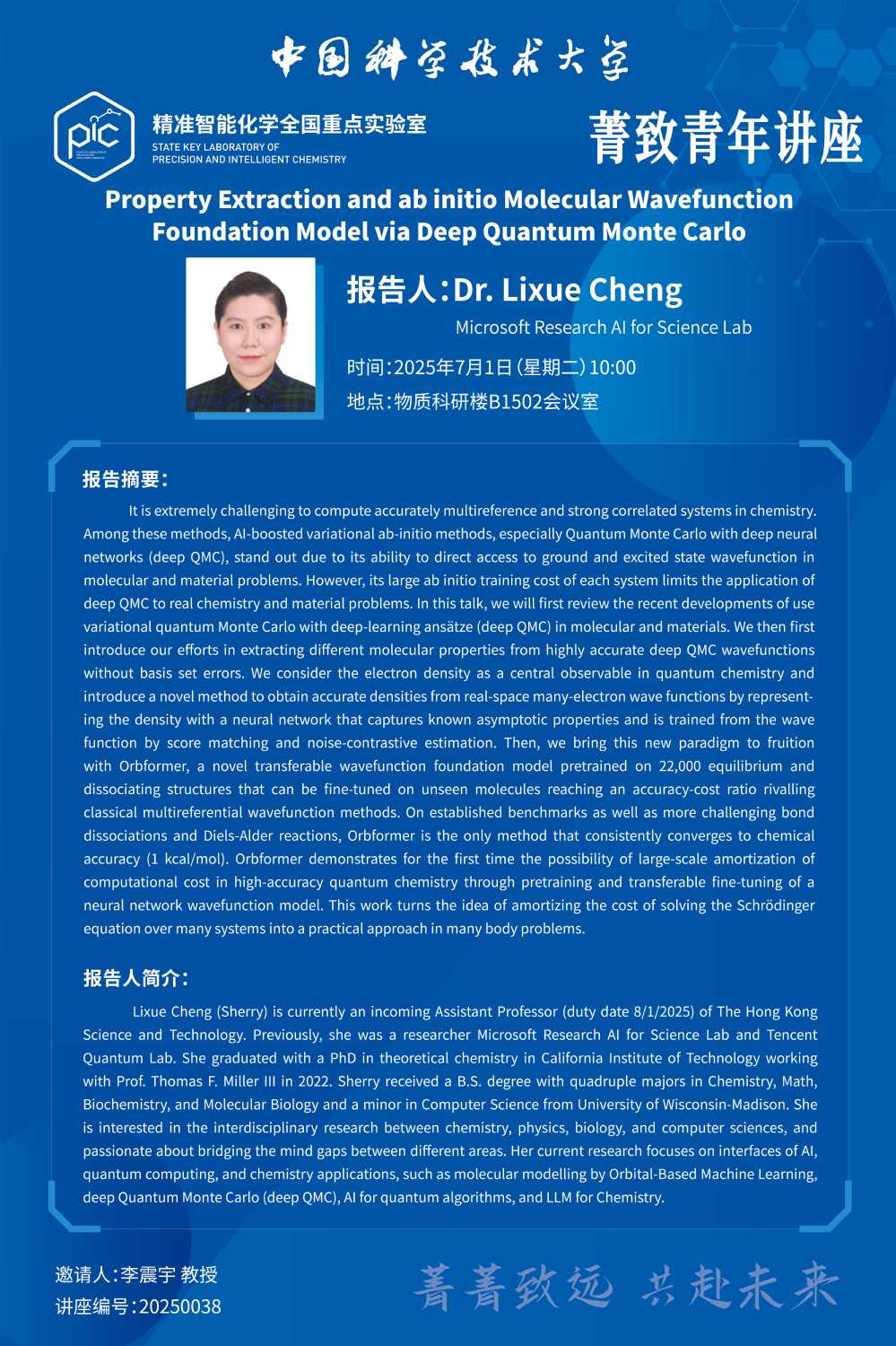报告题目 | Property Extraction and ab initio Molecular Wavefunction Foundation Model via Deep Quantum Monte Carlo |
报告人 | Dr. Lixue Cheng |
报告人单位 | Microsoft Research AI for Science Lab |
报告时间 | 2025年7月1日(星期二)10:00 |
报告地点 | 物质科研楼B1502会议室 |
主办单位 | 精准智能化学全国重点实验室 |
It is extremely challenging to compute accurately multireference and strong correlated systems in chemistry. Among these methods, AI-boosted variational ab-initio methods, especially Quantum Monte Carlo with deep neural networks (deep QMC), stand out due to its ability to direct access to ground and excited state wavefunction in molecular and material problems. However, its large ab initio training cost of each system limits the application of deep QMC to real chemistry and material problems. In this talk, we will first review the recent developments of use variational quantum Monte Carlo with deep-learning ansätze (deep QMC) in molecular and materials. We then first introduce our efforts in extracting different molecular properties from highly accurate deep QMC wavefunctions without basis set errors. We consider the electron density as a central observable in quantum chemistry and introduce a novel method to obtain accurate densities from real-space many-electron wave functions by representing the density with a neural network that captures known asymptotic properties and is trained from the wave function by score matching and noise-contrastive estimation. Then, we bring this new paradigm to fruition with Orbformer, a novel transferable wavefunction foundation model pretrained on 22,000 equilibrium and dissociating structures that can be fine-tuned on unseen molecules reaching an accuracy-cost ratio rivalling classical multireferential wavefunction methods. On established benchmarks as well as more challenging bond dissociations and Diels-Alder reactions, Orbformer is the only method that consistently converges to chemical accuracy (1 kcal/mol). Orbformer demonstrates for the first time the possibility of large-scale amortization of computational cost in high-accuracy quantum chemistry through pretraining and transferable fine-tuning of a neural network wavefunction model. This work turns the idea of amortizing the cost of solving the Schrödinger equation over many systems into a practical approach in many body problems. | |
报告人简介 | Lixue Cheng (Sherry) is currently an incoming Assistant Professor (duty date 8/1/2025) of The Hong Kong Science and Technology. Previously, she was a researcher Microsoft Research AI for Science Lab and Tencent Quantum Lab. She graduated with a PhD in theoretical chemistry in California Institute of Technology working with Prof. Thomas F. Miller III in 2022. Sherry received a B.S. degree with quadruple majors in Chemistry, Math, Biochemistry, and Molecular Biology and a minor in Computer Science from University of Wisconsin-Madison. She is interested in the interdisciplinary research between chemistry, physics, biology, and computer sciences, and passionate about bridging the mind gaps between different areas. Her current research focuses on interfaces of AI, quantum computing, and chemistry applications, such as molecular modelling by Orbital-Based Machine Learning, deep Quantum Monte Carlo (deep QMC), AI for quantum algorithms, and LLM for Chemistry. |

